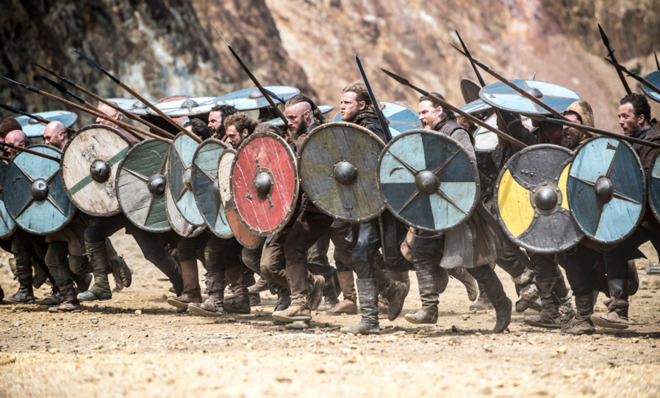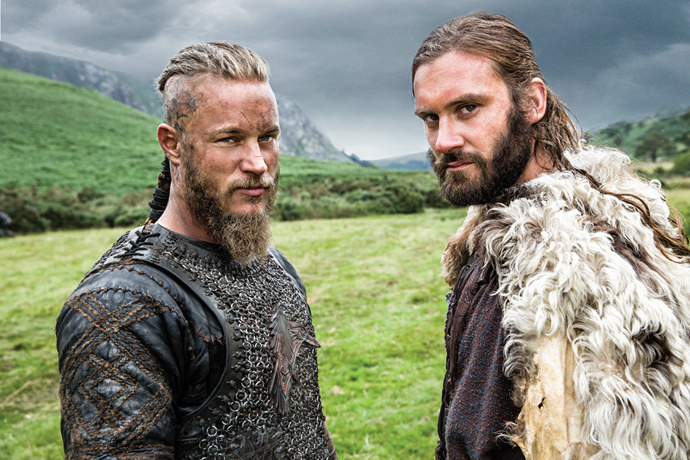Why Vikings is television's boldest historical drama
In an oversaturated genre, The History Channel series stands out

A free daily email with the biggest news stories of the day – and the best features from TheWeek.com
You are now subscribed
Your newsletter sign-up was successful
Racy historical dramas are undeniably trendy right now. Almost every network is eager to jump on the bandwagon, and the silver screen has become saturated with epic period pieces. But in just one season The History Channel's Vikings has proven there's always room at the top — a trend that the show's producers hope to continue as its second season premieres tonight.
A historical drama centered on Vikings is a wide-open opportunity to depict violence, sex, and savagery. But unlike many of its competitors, Vikings doesn't overdo it. Each chapter of the nine-episode first season has its undeniably brutal moments, but it never feels cheap or gratuitous. Instead, the show relies on fundamentally relatable themes of family, loyalty, power, and the pursuit of a higher calling.
Vikings shows a restraint that many similar series lack. For example, Black Sails, the Starz network's attempt at a big budget period drama about a band of seaborne thieves, relies on the shock value of its characters' actions, rather than taking the Vikings approach of focusing more on the characters themselves.
The Week
Escape your echo chamber. Get the facts behind the news, plus analysis from multiple perspectives.

Sign up for The Week's Free Newsletters
From our morning news briefing to a weekly Good News Newsletter, get the best of The Week delivered directly to your inbox.
From our morning news briefing to a weekly Good News Newsletter, get the best of The Week delivered directly to your inbox.
Other shows have been hobbled by overreaching direction, petty plot lines, and gratuitous gore. Starz' earlier foray into the genre, Spartacus, and Showtime's The Tudors and The Borgias fell into the same trap as Black Sails, while Reign, their cousin for the preteen set, is so bad that it's hardly a competitor in the genre.

The acting in Vikings is as thoughtful as the direction and production. Travis Fimmel, who plays Norse hero Ragnar Lothbrok, incites equal parts sympathy and outrage over his morally dubious actions. Clive Standen delivers a dark and compelling performance as Rollo, Ragnar's jealous brother, and the two play off each other in a relationship reminiscent of Cain and Abel. (Season two will determine whether fraternal love can overpower the tension of a brother walking in the shadow of the chosen one.) Katheryn Winnick shines as Lagertha, Ragnar's wife and a warrior in her own right, while Gustaf Skarsgård is a pleasure to watch as Floki, an eccentric, reclusive shipbuilder.
The premise of the show also gives it an advantage. Period pieces like PBS's Downton Abbey are less fertile in terms of plot, and inevitably end up recycling old narratives. Vikings has a relentless forward trajectory. Each episode picks up months after the previous one, and the narrative is continually propelled forward as the Vikings extend the reach of their raids and conquests.
The scope is reminiscent of Game of Thrones, a series that isn't based on real events, but is inspired by history. Like Vikings, Game of Thrones is a show that take place in a lustful, violent world, but does not rely solely on debauchery to be compelling. And while Vikings is historical, its characters live in a universe rich with mytho-religious characters, echoing the cosmic forces in Game of Thrones that add a broader significance to the characters' actions and a crucial element of fate.
A free daily email with the biggest news stories of the day – and the best features from TheWeek.com
In the second season (watch out: spoilers from season one to follow), the stakes are higher for Ragnar, who in season one discovered new land and cultures to the West, dethroned the Earl governing his tribe, and rose to power. Alliances will be tested, romances will be strained, and cultures will collide. In true Viking form, power only remains in the hands of those strong enough to keep it.
Monica Nickelsburg is a digital producer for TheWeek.com. She has previously worked for Transient Pictures, The Daily Beast, NBC, and Forbes. Follow her @mnickelsburg.
-
 Switzerland could vote to cap its population
Switzerland could vote to cap its populationUnder the Radar Swiss People’s Party proposes referendum on radical anti-immigration measure to limit residents to 10 million
-
 Political cartoons for February 15
Political cartoons for February 15Cartoons Sunday's political cartoons include political ventriloquism, Europe in the middle, and more
-
 The broken water companies failing England and Wales
The broken water companies failing England and WalesExplainer With rising bills, deteriorating river health and a lack of investment, regulators face an uphill battle to stabilise the industry